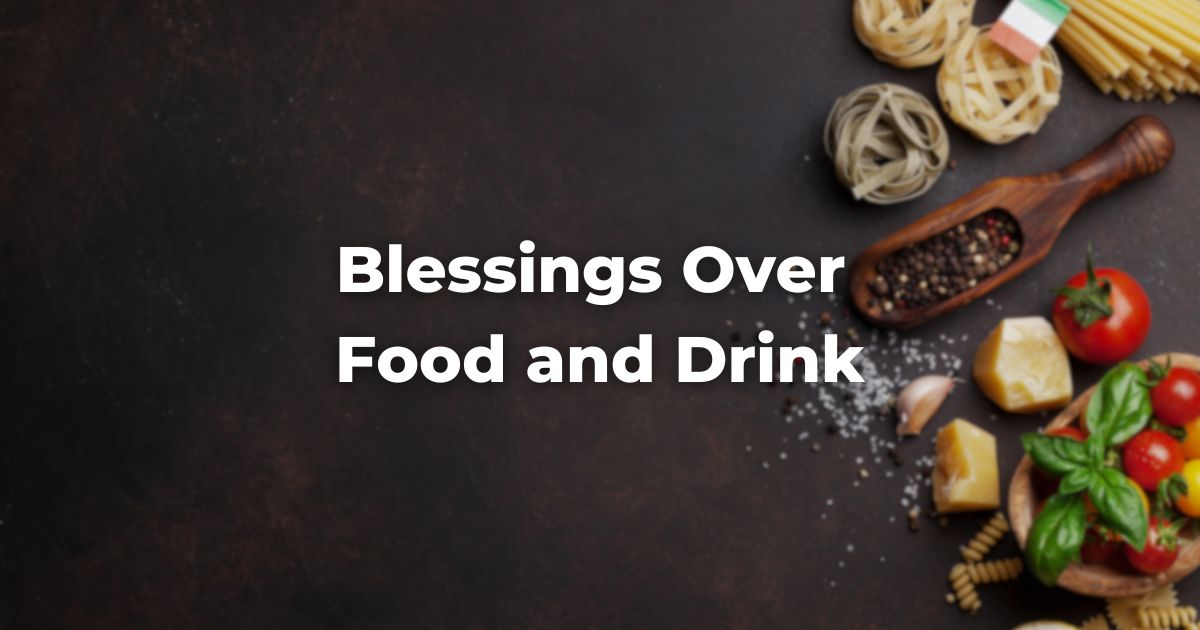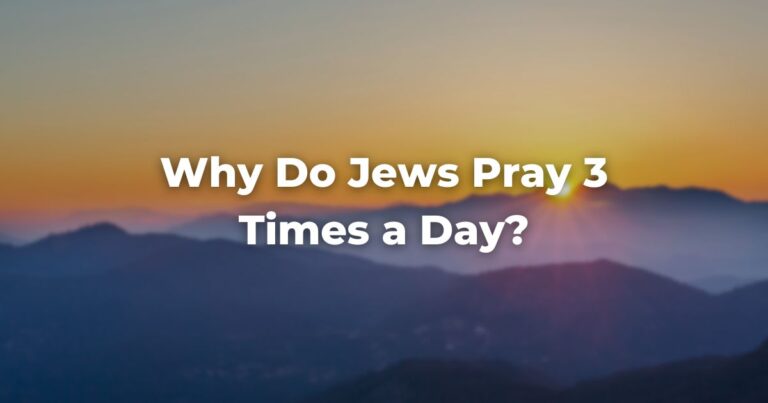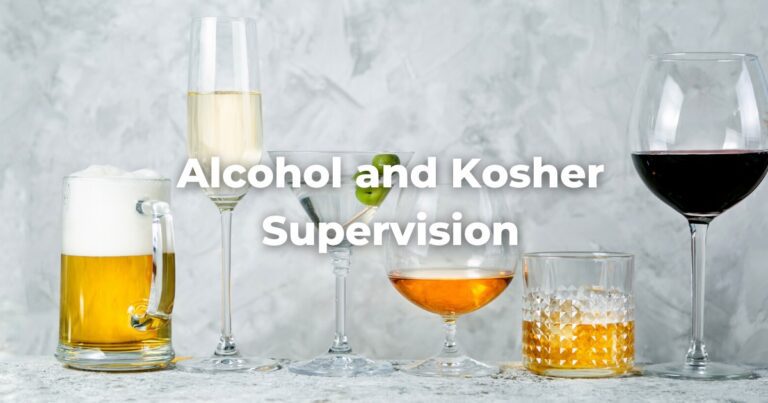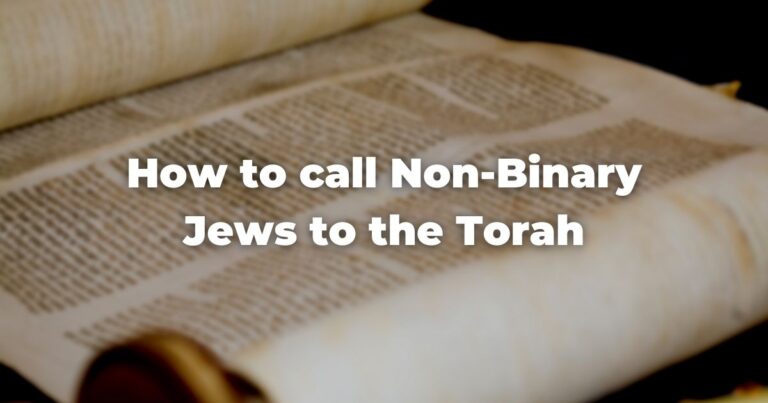One of the essential Jewish practices is the recitation of blessings, particularly over food. It provides us an opportunity to be grateful for what we have, center our attention and intention, and reinforce our relationship with God.
Judaism is passionate about lifting up the mundane moments in our lives, like sitting to eat and sustain our bodies and making them holy moments. A meal is not just a meal but an opportunity to express thankfulness, think about the labor required to provide food to our tables, and reflect on the bounty of the world we live in.
In fact, the TalmudReferring to one of two collections, the Jerusalem and Babylonian Talmuds, edited in the 6th century, that contains hundreds of years of commentary, discussion, and exploration of the ideas in the Mishnah. One could describe it as Mishnah + Gemara = Talmud Read more makes a stronger point about the need to recite blessings over food. The Talmud says (Berakhot 35a:19),
תָּנוּ רַבָּנַן: אָסוּר לוֹ לָאָדָם שֶׁיֵּהָנֶה מִן הָעוֹלָם הַזֶּה בְּלֹא בְּרָכָה. וְכָל הַנֶּהֱנֶה מִן הָעוֹלָם הַזֶּה בְּלֹא בְּרָכָה מָעַל.
The Sages taught: It is prohibited for a person to gain benefit from [anything] in this world without a blessing. Anyone who benefits from this world without a blessing, one has committed fraud.
Here, the rabbis highlight that eating or benefiting from anything without reciting a blessing is tantamount to theft or misuse.
Maimonides expresses this another way (Mishneh TorahRefers to the first five books of the Hebrew Bible, the Tanakh, also called the Five Books of Moses, Pentateuch or the Hebrew equivalent, Humash. This is also called the Written Torah. The term may also refer to teachings that expound on Jewish tradition. Read more, Blessings 1:3):
וּכְשֵׁם שֶׁמְּבָרְכִין עַל הַהֲנָיָה כָּךְ מְבָרְכִין עַל כָּל מִצְוָה וּמִצְוָה וְאַחַר כָּךְ יַעֲשֶׂה אוֹתָהּ. וּבְרָכוֹת רַבּוֹת תִּקְּנוּ חֲכָמִים דֶּרֶךְ שֶׁבַח וְהוֹדָיָה וְדֶרֶךְ בַּקָּשָׁה כְּדֵי לִזְכֹּר אֶת הַבּוֹרֵא תָּמִיד אַף עַל פִּי שֶׁלֹּא נֶהֱנָה וְלֹא עָשָׂה מִצְוָה:
And just as we bless over benefitting [from something], so too we bless over each and every mitzvah, and then, after that, we fulfill it. And the many blessings that the Sages established of praise, gratitude, and request [are there] in order to remember the Creator always, even if we do not benefit or do the mitzvah.
So how do the blessings over food and drink work?
For each food, there are blessings to recite before and after eating. Different categories of foods have different blessings.
For blessings before one eats:
For bread:
בָּרוּךְ אַתָּה ה׳ אֱלֹהֵינוּ מֶלֶךְ הָעוֹלָם הַמּוֹצִיא לֶחֶם מִן הָאָרֶץ.
Barukh attah Adonai eloheinu melekh ha-olam, ha-motzi leḥem min ha-aretz.
Praised are You, Lord our God, Sovereign of the Universe, who brings forth bread from the earth.
For food (other than bread) prepared from wheat, barley, rye, oats, or spelt:
בָּרוּךְ אַתָּה ה׳ אֱלֹהֵינוּ מֶלֶךְ הָעוֹלָם בּוֹרֵא מִינֵי מְזוֹנוֹת.
Barukh attah Adonai eloheinu melekh ha-olam, bo-re minei m’zonot.
Praised are You, Lord our God, Sovereign of the Universe, who creates various kinds of nourishment.
For wine or grape juice:
בָּרוּךְ אַתָּה ה׳ אֱלֹהֵינוּ מֶלֶךְ הָעוֹלָם בּוֹרֵא פְּרִי הַגָּפֶן.
Barukh attah Adonai eloheinu melekh ha-olam, bo-re p’ri ha-gafen.
Praised are You, Lord our God, Sovereign of the Universe, who creates the fruit of the vine.
For fruit:
בָּרוּךְ אַתָּה ה׳ אֱלֹהֵינוּ מֶלֶךְ הָעוֹלָם בּוֹרֵא פְּרִי הָעֵץ.
Barukh attah Adonai eloheinu melekh ha-olam, bo-re p’ri ha-etz.
Praised are You, Lord our God, Sovereign of the Universe, who creates the fruit of the tree.
For food that grows in the ground:
בָּרוּךְ אַתָּה ה׳ אֱלֹהֵינוּ מֶלֶךְ הָעוֹלָם בּוֹרֵא פְּרִי הָאֲדָמָה.
Barukh attah Adonai eloheinu melekh ha-olam, bo-re p’ri ha-adamah.
Praised are You, Lord our God, Sovereign of the Universe, who creates the fruit of the ground.
For other food and drink that do not fall into any other categories:
בָּרוּךְ אַתָּה ה׳ אֱלֹהֵינוּ מֶלֶךְ הָעוֹלָם שֶׁהַכֹּל נִהְיָה בִּדְבָרוֹ.
Barukh attah Adonai eloheinu melekh ha-olam, she-ha-kol nihyeh bi-d’varo.
Praised are You, Lord our God, Sovereign of the Universe, at whose word all things come into being.
For blessings after one eats:
After eating food or a meal that includes bread, upon which you have recited Ha-Motzi, one recites the Birkat Ha-Mazon. You can find that on Sefaria here.
After food, drink, or a meal that includes food that is not bread, upon which you have not recited Ha-Motzi or She-ha-kol, one recites the Brakhah Achronah. You can find that on Sefaria here.
After eating food or drinking something upon which you have recited She-ha-kol, one recites Borei Nefashot. You can find that on Sefaria here.
What if a meal I’m eating has more than one food?
If you are eating a meal with multiple kinds of food, there are a few steps to decide which blessing is the correct one to recite.
The essential framework requires two concepts: ikar (literally, the essence) which is the primary food being eaten, and tofel (the secondary food). Essentially, when eating a meal that combines many foods, the primary food exempts the other foods from requiring a blessing. This is the case if the foods are all mixed tougher or separate. (SA Orach Hayyim 212)
Generally speaking, if there is bread at the meal, that becomes the ikar, the primary food, and exempts whatever else you’re eating from requiring a blessing.
If you’re eating a salad or other dish with mixed ingredients, you can recite a blessing over the majority item of the ingredients.
If there was no primary ingredient, and all ingredients were considered of the same importance, one could recite a blessing for each item separately.
Author
-

Rabbi Jeremy Markiz is a teacher and consultant. Based in the Washington, DC area, he teaches the Torah of personal growth, meaning and intentionality, and making the world a better place. He writes a newsletter called, With Torah and Love. Rabbi Markiz helps clergy, congregations, and Jewish organizations grow and communicate clearly in the digital world, develop effective strategies, and solve problems with his consulting firm, Next Level Rabbinics.
View all posts





